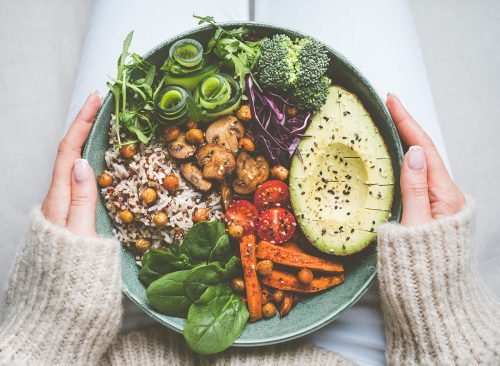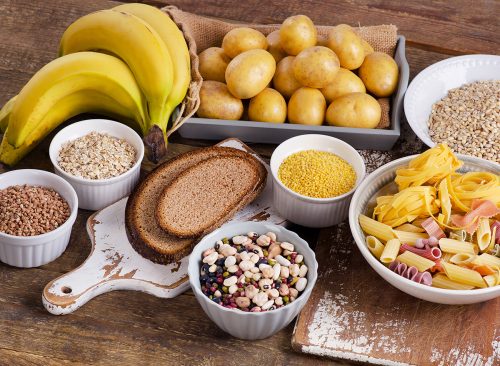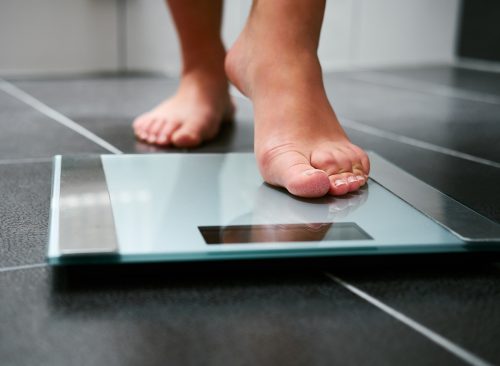
Losing weight and keeping it off can be a challenge at any age, but it can be especially difficult after age 60. One reason is that metabolism begins to slow around that year, declining about 1% each year thereafter. Menopause and other health issues can compound the challenge. But it's far from a lost cause—people can and do lose weight for good, no matter how many candles are on your cake. We asked experts about the best ways to go about it. They gave us essential ways to lose weight after 60 and keep it off for good.

We lose muscle mass with age. It declines about 3% to 8% each decade after the age of 30 and accelerates after 60. "Muscle makes a big difference when trying to lose weight. It's really important to build or retain our muscle mass as we age," says Bess Berger, RDN, CDN, CLT, a registered dietitian in New Jersey who specializes in menopause and PCOS. "This doesn't mean going to the gym for hours to get shredded. It means consistent weight-bearing or resistance training a few times a week. The more muscle we have, the more calories we burn. The less muscle we have, the harder it is to lose or maintain our weight."

"The only way to lose weight is to consume fewer calories than you burn," says Dr. Charlie Seltzer, CSCS, a board-certified physician in obesity medicine and internal medicine and a certified strength and conditioning specialist. In addition to doing strength training exercises, "It's also important to keep up your non-exercise activity output by getting in plenty of steps," he says.

For weight loss, Seltzer recommends a mild calorie deficit—for example, if you consume 2,000 calories a day, reduce that by 200. "Pair that with increased activity and you're good to go," he says.

"It's important to lose weight without the restriction and deprivation of a diet," says Lisa Goldberg, MS, CNS, CDN, a certified dietitian nutritionist and weight loss coach. "Establishing a healthy eating routine of whole, unprocessed foods and allowing an indulgence once or twice a week eliminates the guilt most people feel when they 'diet' for weight loss."

"A plant-based diet generally supplies you with a balance of healthy fats, fiber, vitamins, minerals, and phytonutrients, all helping to reduce your blood pressure and LDL cholesterol, lower your risk for diabetes, and promote a healthy weight," says Amy Margulies, RD, CDCES, LDN, NBC-HWC, a Philadelphia-based registered dietitian and owner of The Rebellious RD. "It doesn't mean you have to give up all meat or go vegan. It does mean you may need to add more to your plate in the way of vegetables, fruits, nuts, and seeds."

"By adding more protein to your diet, you can help preserve your muscle mass and maintain your metabolism," says Joanna Wen, a certified health coach and founder of Spices & Greens. Good sources of protein include lean meats, fish, eggs, beans, and nuts.

"Noticing your habits and behaviors around food will allow you to see why you may not be losing weight," says Goldberg. "Notice if you're eating when you're not even hungry or if you overeat at your meals. Are you from the clean-the-plate club? Can you actually stop eating sooner than you do and be content?"

"There may be something to the adage, 'Eat breakfast like a king and dinner like a pauper,'" says Dr. Joan Salge Blake, EdD, RDN, LDN, FAND, a nutrition professor at Boston University and host of the podcast Spot On!. "Emerging research suggests that when you eat during the day may play an important role in weight loss and management. Consuming the majority of your daily calories later in the day may make it more challenging to lose and maintain weight loss. The body's circadian rhythms can influence the activity of enzymes and hormones that regulate your metabolism. Eating the majority of your calories later in the day fouls up the circadian rhythms in your body and promotes more fat storage."

Don't go zero-carb, but be conscious of what carbs you're consuming, advises Margulies. Carbohydrates should be 40% or less of your diet, and they should be high quality. "When it comes to healthy aging, about 15% to 25% of your plate should be whole-grain healthy carbs," she says. "Choosing whole grains like quinoa, brown rice, whole wheat pasta and bread, and starchy veggies like sweet potatoes and corn, provides us with the energy our bodies need for our cells, tissues, and organs to function."

"Walking helps you keep weight off, even when you're older," says Marshall Weber, CPT, a certified personal trainer and owner of Jack City Fitness in Boise, Idaho. "It's an underrated exercise. You can incentivize yourself by getting a smartwatch that tracks your steps and distance. Walking each day for a few miles will burn a ton of calories and help you stay in shape. I encourage all my fitness gurus to walk as much as they can during the day."

"Managing stress and emotional health is also an important part of successful weight loss and maintenance after age 60," says Wen. "As we age, we may be dealing with a range of stressors, from health issues to changes in our social lives. Finding healthy ways to manage emotional health, such as through meditation, deep breathing, or talking with a supportive friend or family member, can help you stay on track with your weight loss goals and improve your overall well-being."
RELATED: 90% of People Who Die From COVID Have This in Common

"Most people try to lose weight in a way that's not sustainable for the long term," says Goldberg. "This is why diets never work and the weight comes back. How you eat to lose weight is how you need to continue to eat to maintain the weight you lose. You have to eliminate the eating habits and behaviors that led to the initial weight gain."














